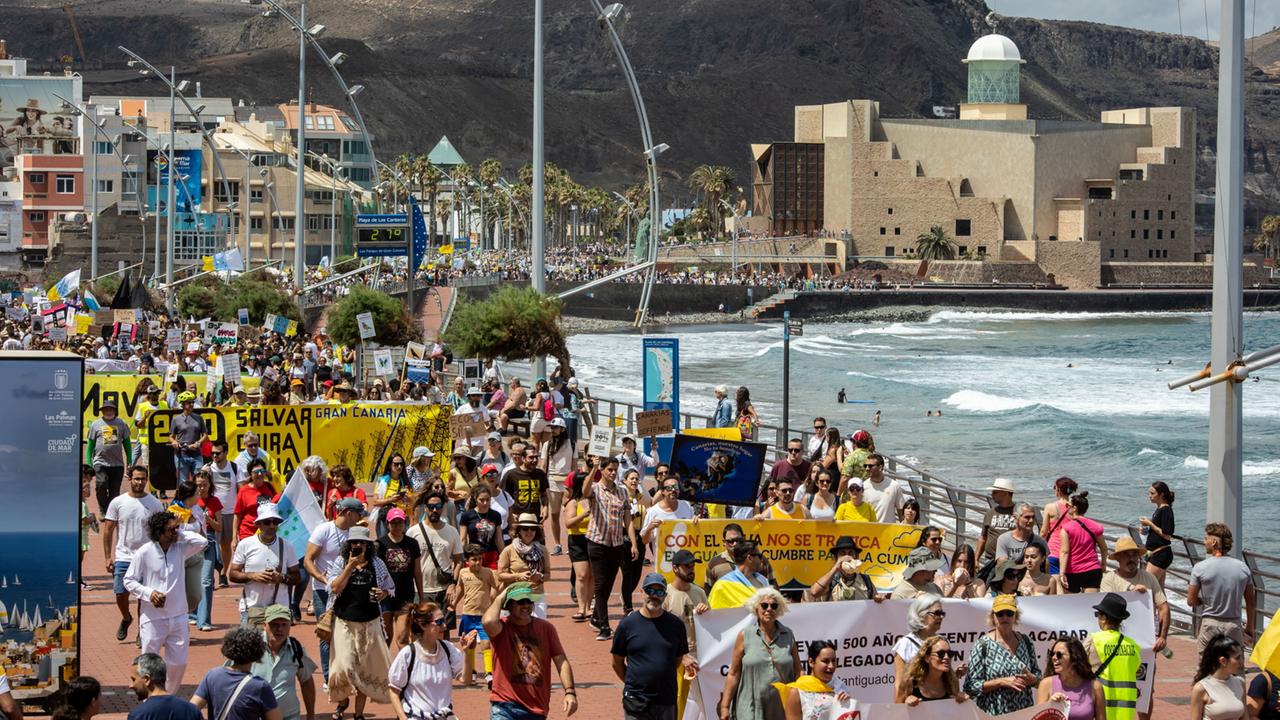report
Tens of thousands of people protested in the Canary Islands over the weekend against the “sell-off” of their islands, and several activists are on hunger strike. Now many are wondering what the protest can achieve.
20 degrees mild, the sea lapping on the rocks, lounge music and a quiet babble of voices from the nearby beach bar. At this time of year there is still space at “Playa la Tejita” in the south of Tenerife.
Pure idyll, it seems. If it weren't for these graffiti: “Tourist go home” is emblazoned in capital letters on a cable box in front of a construction site: various large, half-finished shell buildings, lots of concrete and steel. It is a place where the bright side and the dark side of tourism coincide: the beauty of nature and the problems that more and more hotel and apartment buildings are causing on the island.
“We want ecotourism and sustainable tourism, but we don't want overpopulation,” a man shouts when he sees our camera. He lives in the Canary Islands himself and is in solidarity with the activists who are protesting against too much tourism on the islands. It's THE topic of conversation among the islanders these days.
Activists fear the Canary Islands will be sold out
Victor Martín, geography professor and press spokesman for the movement “Canarias se agota” – against the “sell-out of the Canary Islands” – explains that the activists' protest was sparked at this and another construction site. There are doubts about the building permit so close to the water.
The activists are calling for a construction stop and a moratorium before the Canary Islands authorities allow further projects. A few bays further on, around 400 luxury apartments are being built on the former huge site of a tomato and banana farm – with a clear view of the sea.
“We want this area to be used for something other than more and more apartments and hotels,” says activist Victor Martín, adding that tourism has been taking over more and more land for half a century.
mass tourism makes tax coffers ring
In the distance you can see the high-rise buildings of “Las Americas”, the center of package and mass tourism on Tenerife. The cash registers of those who make a living from tourism are ringing here. And for whom the protest of the demonstrators is too harsh.
According to data from the Canary Islands Statistics Institute, tourism is the most important economic factor on the islands and contributed around 35 percent of Canary Islands GDP in 2022. A whopping 3.4 billion euros ended up in the tax coffers.
On the sunny side, the tourism industry is booming, but those who don't benefit from it are in the shadows. Wages in the Canary Islands are the second lowest in Spain, and the housing shortage is one of the biggest problems for the protest movement. Living space is often rented to tourists via platforms. This means that living space is becoming scarce and expensive. Too expensive for the Canarians.
Protest against too much tourism, not against tourists
Late in the afternoon, many German tourists stroll along the harbor promenade in Puerto Santa Cruz in the north of Tenerife. Most people show understanding for the demonstrators. Like Christian Heintz from Kiel, who is there with his family.
However, he believes that Spain attracted a bit of drinking tourism in the 1960s and 1970s, and he made a good living from it for decades. “Just getting rid of it overnight, it won’t be easy.”
German travelers still seem to feel welcome in the Canary Islands, despite all the hoteliers' fears. The activists would blame the islands' problems on tourism, said Jorge Marichal, president of the hotel association in Tenerife, but that is actually the solution.
The problem is that the population of the Canary Islands has grown by 30 percent in the past 25 years. “But there are no more highways, schools, hospitals and housing, none of that has grown.”
Politics imitates Demonstrations Announcements
Some complain about too little infrastructure, others about too much tourism – and now? At the start of the week, the President of the Canary Islands, Fernando Clavijo, praised the weekend's peaceful protests and admitted that the tourism model needed to be reviewed and realigned. There will be discussions. He is critical of the demonstrators' demand for a moratorium on further construction projects.
Augustín Santana-Talavera from the Institute of Tourism at the University of La Laguna in Tenerife is skeptical about quick solutions. The Canary Islands government's statements were more along the lines of “we're working on it” and the tourism industry apparently doesn't want to talk about wages, he says tagesschau.de. “But it could be that the idea of a tourism tax will be taken up,” he himself thinks it is particularly important to regulate and control holiday accommodation.
Activist Victor Martín draws a positive conclusion for the activists after the demonstrations at the weekend. They felt confirmed in their fight by the many participants. The hunger strike continues nonetheless.
And the tourists themselves? We'll probably continue to enjoy the sunny side of the islands and not be put off by the “tourist go home” graffiti.
Franka Welz, ARD Madrid, tagesschau, April 23, 2024 12:02 p.m





